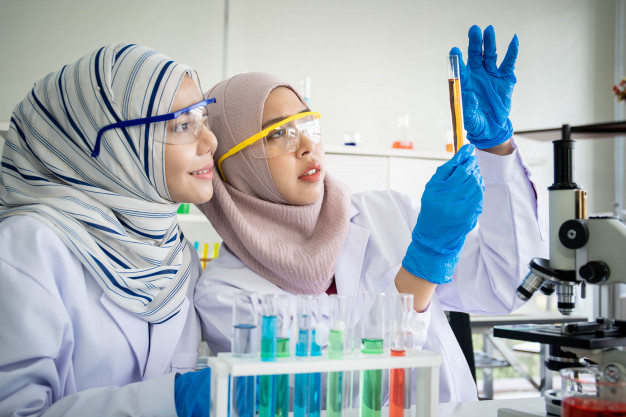A-Level Chemistry

A-LEVEL CHEMISTRY
This course demands an enthusiasm for chemistry, a commitment to work hard and an ability to work independently and take responsibility for your own progress, but the effort is rewarded by a well-regarded qualification. Practical work is an important aspect of the course. A significant part of the written A Level exams is indirect assessment of practical skills. Practical skills are also assessed directly for the separate Practical Endorsement. A pass in the Practical Endorsement is an entry requirement for many university courses.
Chemistry is the study of the elements and their compounds. It is a basic science, key to understanding the world we live in and a practical science with an enormous number and variety of important applications.
The course is divided into topics, each containing different key concepts of chemistry. Once the main features of a topic have been developed, applications are considered. The delivery methods include lectures, laboratory work and group work, with regular homework being set which plays an important part of the learning process. Emphasis throughout the course is on developing knowledge, competence and confidence in practical skills and problem solving.
Key Units
- Atoms, compounds, molecules and equations
- Amount of substance
- Acid-base and redox reactions
- Electrons, bonding and structure
- The periodic table and periodicity
- Group 2 and the halogens
- Qualitative analysis
- Enthalpy changes
- Reaction rates and equilibrium (qualitative)
- Basic concepts
- Hydrocarbons
- Alcohols and haloalkanes
- Organic synthesis
- Analytical techniques (IR and MS)
- Reaction rates and Equilibrium (quantitative)
- pH and buffers
- Enthalpy, entropy and free energy
- Redox and electrode potentials
- Transition elements
- Aromatic compounds
- Carbonyl compounds
- Carboxylic acids and esters
- Nitrogen compounds
- Polymers
- Organic synthesis
- Chromatography and spectroscopy (NMR)
*Please note that unit information is subject to change depending on examinations board. Please contact admissions@minhajcollege.ac.uk
Assessment
Exams and Practical Endorsement (see Key Units for full details).
3 GCSEs at A* – C (Grade 4-9) PLUS a minimum of grade 4 in English Language and Maths.
MCM will consider alternative qualifications to GCSE’s and for mature students will consider work history as part of the entry requirement process. If you do not meet the above entry requirements please get in touch and we maybe able to help – admissions@minhajcollege.ac.uk.
Many students who study science subjects at A-level progress to university to continue their studies in a variety of course areas. Biology could prepare you for a wide range of scientific careers/studies including:
- Medicine
- Veterinary Science
- Genetics
- Forensic Science
- Ecology
- Agriculture
- Biology
- Chemistry
- Pharmacology/Pharmaceutical Sciences
- Nursing
- Medicine/Biomedical Sciences
- Psychology

